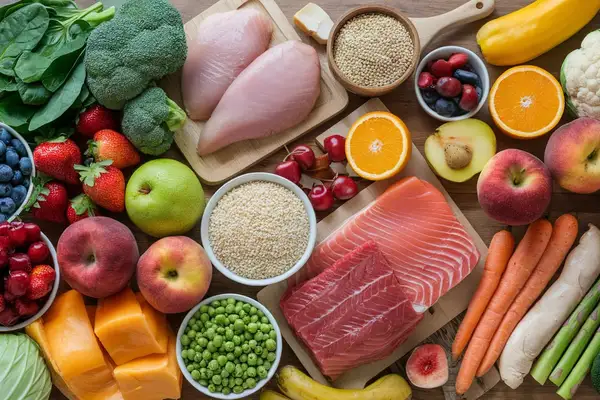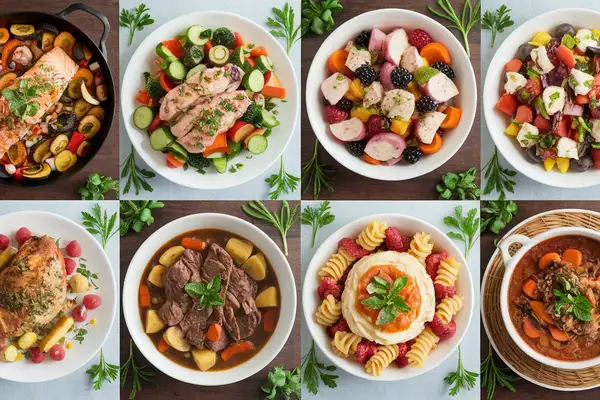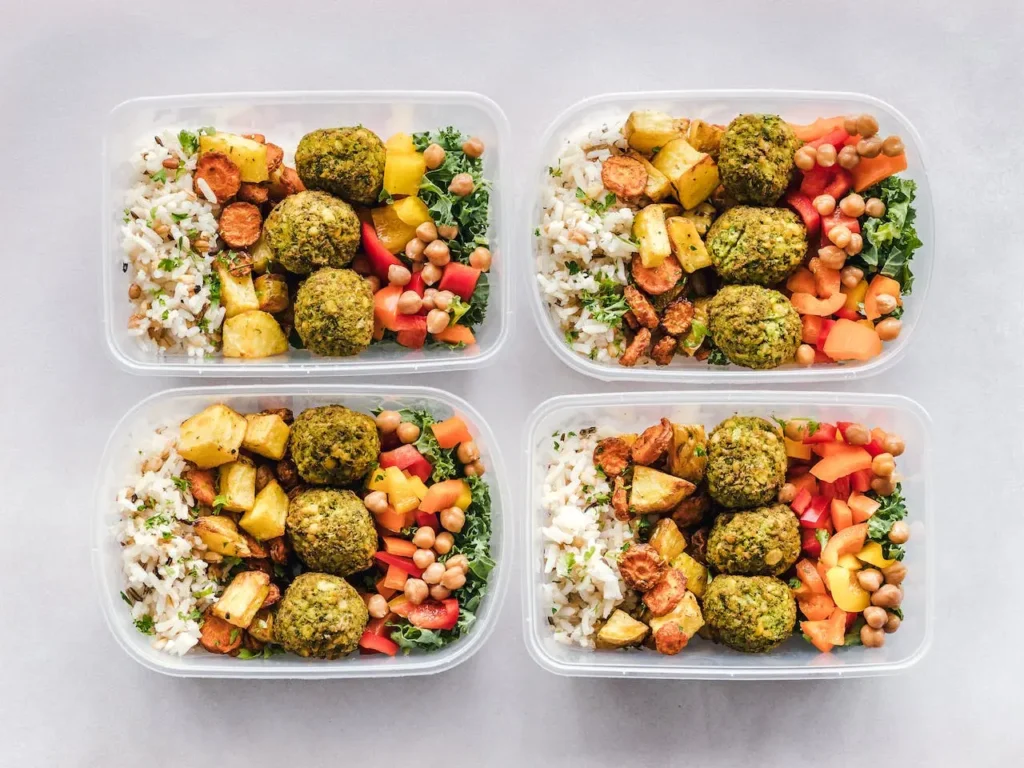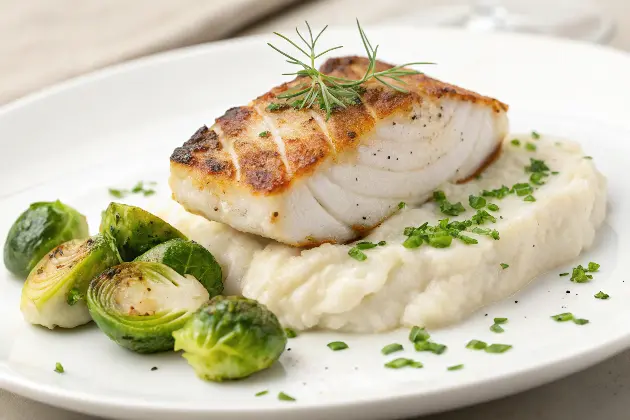Free 7 Day Anti Inflammatory Diet Meal Plan
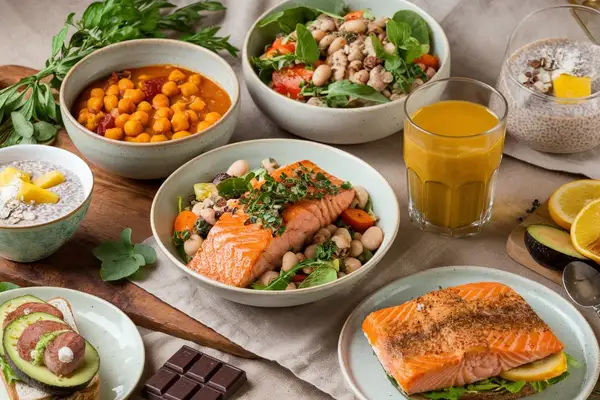
This post may contain affiliate links, meaning I may earn a commission if you make a purchase, at no extra cost to you. I only recommend products I trust. Thank you for your support.
Inflammation can be a double-edged sword. While it’s your body’s natural response to injury and illness, chronic inflammation can lead to a host of health problems, from heart disease to arthritis.
The good news? Your diet can play a significant role in managing inflammation. An anti inflammatory diet is a powerful way to nourish your body and reduce the risk of chronic diseases.
This 7 day anti inflammatory diet meal plan is designed to help you start your journey to better health, focusing on foods that not only fight inflammation but also lower triglycerides, a key factor in heart health.
Let’s dive in and discover how you can nourish your body with anti inflammatory foods.
What is an Anti Inflammatory Diet?
An anti inflammatory diet is an eating approach that emphasizes whole, nutrient-dense foods that help reduce chronic inflammation in the body.
It’s rich in fruits, vegetables, lean proteins, and healthy fats, and it avoids processed foods, sugary snacks, and excessive red meat.
An anti inflammatory diet focuses on foods that are high in antioxidants, omega-3 fatty acids, and other anti-inflammatory compounds.
Anti Inflammatory Food List
These anti inflammatory foods are rich in antioxidants, polyphenols, omega-3 fatty acids, and other compounds that have been shown to have anti-inflammatory properties.
Here’s a comprehensive list of anti inflammatory foods that fight inflammation:
Fruits and Vegetables
- Berries (strawberries, blueberries, raspberries, blackberries)
- Cherries
- Grapes
- Pineapple
- Oranges
- Bananas
- Lemon
- Leafy greens (spinach, kale, collard greens)
- Broccoli
- Avocados
- Cabbage
- Brussel sprouts
- Peppers (bell peppers, chili peppers)
- Mushrooms
- Tomatoes
- Sweet potato
- Cauliflower
Fatty Fish and Seafood
- Salmon
- Tuna
- Sardines
- Mackerel
- Herring
- Anchovies
- Shrimp
Proteins
- Tofu
- Tempeh
- Eggs
Whole Grains
- Oatmeal
- Quinoa
- Brown rice
- Whole wheat bread
Legumes
- Lentils
- Chickpeas
- Black beans
- White beans
- Pinto beans
Nuts and Seeds
- Tree nuts (almonds, walnuts)
- Peanuts
Beverages
- Green tea
- Ginger tea
- Turmeric tea
- Tart cherry juice
- Coffee
- Bone broth
- Water
- Herbal tea
Herbs and Spices
- Turmeric (contains curcumin)
- Ginger
- Black pepper
- Cardamom
- Cinnamon
- Clove
- Cumin
- Fenugreek
- Fennel
- Garlic
- Onion
- Rosemary
Healthy Oils
- Extra virgin olive oil
- Avocado oil
- Flaxseed oil
Foods to Avoid on an Anti Inflammatory Diet
Here’s a list of foods to avoid on an anti inflammatory diet:
- Processed foods
- Foods with added sugar
- Foods high in salt
- Unhealthy oils (corn oil, soybean oil, canola oil)
- Processed carbohydrates (white bread, white pasta, baked goods)
- Processed snack foods (chips, crackers)
- Premade desserts (cookies, candy, ice cream)
- Excess alcohol
- Red meat
- Processed meats (bacon, hot dogs, sausage)
- Butter
- Whole milk
- Cheese and full-fat dairy products
- Fried foods
- Foods containing trans fats (partially hydrogenated oils)
- Refined grains
- Processed sugars (foods made with cane sugar or corn syrup)
- Soda and sugary beverages
7 Day Anti Inflammatory Diet Meal Plan
This 7 day anti inflammatory diet meal plan includes a variety of anti inflammatory foods that help reduce inflammation, lower triglycerides, and promote balanced nutrition.
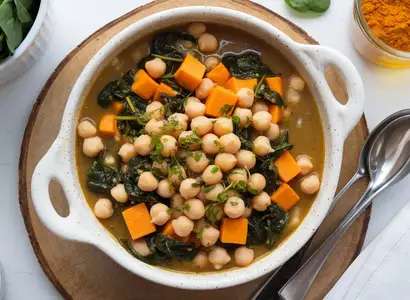
Day 1
Breakfast:
- Overnight Oats with Berries and Almonds: Combine 1/2 cup rolled oats with 1 cup almond milk. Top with 1/4 cup blueberries, 1/4 cup raspberries, 1 tablespoon chia seeds, and 2 tablespoons sliced almonds.
Lunch:
- Tuna and White Bean Salad with Mixed Greens: Mix 4 oz tuna with 1/2 cup white beans, 2 cups mixed greens, 1/2 cup cherry tomatoes, 1/2 cup cucumbers, and 1/4 cup red onion. Dress with 2 tablespoons olive oil.
Dinner:
- Chickpea Sweet Potato Stew: Prepare a stew using 1 cup chickpeas, 1 medium sweet potato (cubed), 1/2 onion (chopped), 2 cloves garlic (minced), 2 cups spinach, and 2 cups vegetable broth. Season with 1 teaspoon cumin and 1/2 teaspoon turmeric.
Snacks:
- Apple Slices with Almond Butter: Enjoy 1 medium apple sliced with 2 tablespoons of almond butter.
- Green Tea: Brew 1 cup of green tea and enjoy as a refreshing drink.
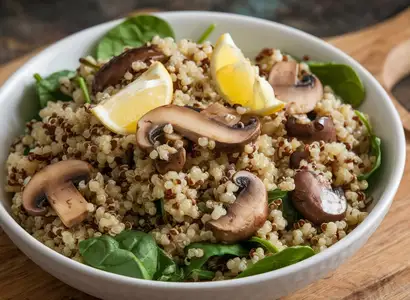
Day 2
Breakfast:
- Berry Chia Seed Pudding: Mix 1/4 cup chia seeds with 1 cup almond milk and let it sit overnight. In the morning, top with 1/2 cup mixed berries and a sprinkle of 1/4 teaspoon cinnamon.
Lunch:
- Mushroom and Garlic Quinoa Salad: Combine 1 cup cooked quinoa with 1 cup sautéed mushrooms and 2 cloves garlic. Toss with 1 cup fresh spinach and 2 tablespoons lemon vinaigrette.
Dinner:
- Baked Salmon with Roasted Vegetables: Oven-bake a 6 oz salmon fillet with 1 cup broccoli, 1/2 medium sweet potato (cubed), and 1/2 cup carrots, drizzled with 1 tablespoon olive oil and seasoned with 1/2 teaspoon turmeric and 1/4 teaspoon black pepper.
Snacks:
- Carrot Sticks with Hummus: Enjoy 1 cup carrot sticks with 1/4 cup hummus.
- Turmeric Ginger Tea: Brew 1 cup hot water with 1/2 inch fresh ginger (sliced) and 1/2 teaspoon ground turmeric. Add a squeeze of 1/4 lemon and 1 teaspoon honey for extra flavor.
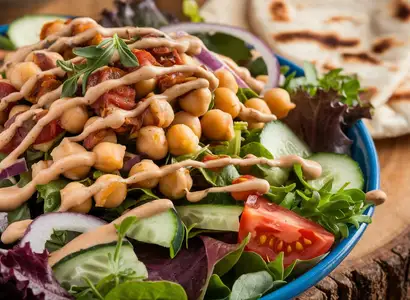
Day 3
Breakfast:
- Smoothie with Spinach, Pineapple, and Ginger: Blend 1 cup spinach, 1/2 cup pineapple, 1 small banana, 1 teaspoon ginger, and 1 cup almond milk, with 1 tablespoon of flaxseeds.
Lunch:
- Chickpea Shawarma Salad: Toss 1 cup chickpeas with 2 cups mixed greens, 1/2 cup cucumbers, 1/2 cup tomatoes, and 1/4 cup red onion. Dress with 2 tablespoons tahini.
Dinner:
- Lemon Chicken with Asparagus: Bake 6 oz chicken breast with 1 cup asparagus, 1/2 lemon (sliced), 2 cloves garlic, and 1 tablespoon olive oil.
Snacks:
- Mixed Berries and Dark Chocolate Squares: Indulge in 1/2 cup mixed berries paired with 2 squares of dark chocolate.
- Hummus with Vegetables: Enjoy 1/4 cup hummus with 1 cup sliced vegetables such as carrots, cucumbers, and bell peppers.
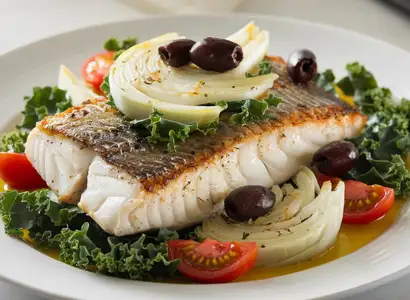
Day 4
Breakfast:
- Avocado Toast with Smoked Salmon: Spread 1/2 avocado on 2 slices of whole grain toast and top with 3 oz smoked salmon, 1 tablespoon flaxseeds, and a squeeze of lemon juice.
Lunch:
- Sardine and Avocado Sandwich: Spread 1/2 avocado on 2 slices of whole grain bread. Top with 4 oz sardines and 1/4 cup arugula.
Dinner:
- Mediterranean Cod with Fennel, Kale, and Black Olives: Pan-sear a 6 oz cod fillet with 1/2 bulb fennel (sliced), 1 cup kale, and 1/4 cup black olives. Bake with 1/2 cup cherry tomatoes and 1 tablespoon olive oil.
Snacks:
- Cucumber Slices with Cottage Cheese: Dip 1 cup cucumber slices into 1/2 cup cottage cheese. (Cucumber slices, cottage cheese)
- Chickpea Puffs: Enjoy 1/4 cup chickpea puffs as a crunchy snack.
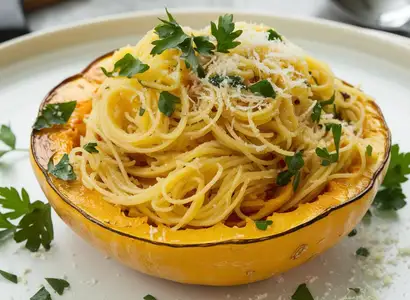
Day 5
Breakfast:
- Chia Pudding with Mango and Coconut: Prepare 1/4 cup chia seeds with 1 cup coconut milk. Top with 1/2 cup diced mango and 2 tablespoons shredded coconut.
Lunch:
- Spaghetti Squash Garlic Noodles: Roast 1 cup spaghetti squash and toss with 2 cloves garlic (sautéed), 1 tablespoon olive oil, 2 tablespoons chopped parsley, and 1 tablespoon parmesan cheese.
Dinner:
- Baked Sweet Potatoes with Tahini Sauce: Roast 1 medium sweet potato and drizzle with a sauce made from 2 tablespoons tahini, 1 tablespoon lemon juice, and 1 clove garlic. Top with 1 tablespoon sesame seeds.
Snacks:
- Celery Sticks with Almond Butter: Pair 1 cup celery sticks with 2 tablespoons almond butter. (Celery sticks, almond butter)
- Almond Dark Chocolate: Savor 2 squares of dark chocolate with 1/4 cup almonds.
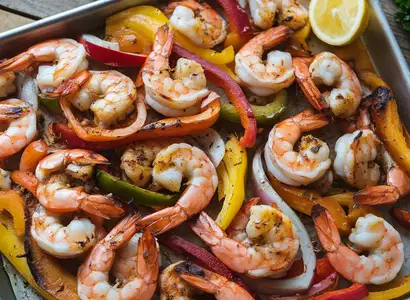
Day 6
Breakfast:
- Berry Smoothie Bowl with Granola: Blend 1/2 cup mixed berries and 1 small banana with 1/2 cup almond milk. Top with 1/4 cup granola, 1 tablespoon chia seeds, and 2 tablespoons sliced almonds.
Lunch:
- Shrimp and Cauliflower Grits: Sauté 4 oz shrimp with 2 cloves garlic and serve over 1 cup cauliflower grits. Top with 1 tablespoon parmesan cheese.
Dinner:
- Sheet Pan Shrimp Fajitas: Bake 6 oz shrimp with 1 cup bell peppers (sliced) and 1/2 cup onions (sliced), seasoned with 1 teaspoon fajita spices. Serve in 2 whole grain tortillas.
Snacks:
- Apple Slices with Walnuts: Enjoy 1 medium apple sliced paired with 1/4 cup walnuts. (Apple slices, walnuts)
- Sweet Potato Chips: Bake 1 cup thinly sliced sweet potatoes with 1 tablespoon olive oil and a pinch of sea salt.
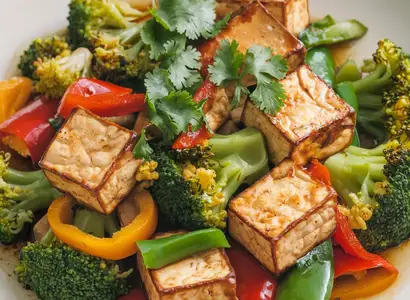
Day 7
Breakfast:
- Scrambled Eggs with Spinach and Whole Grain Toast: Scramble 2 eggs with 1 cup sautéed spinach and serve with 2 slices of whole grain toast and 1/4 avocado sliced.
Lunch:
- Baked Mackerel with Roasted Sweet Potato and Steamed Broccoli: Bake a 6 oz mackerel fillet with 1 cup roasted sweet potatoes and 1 cup steamed broccoli. Drizzle with 1 tablespoon olive oil and season with 1/2 teaspoon turmeric and 1/4 teaspoon black pepper.
Dinner:
- Baked Tofu Stir-Fry with Mixed Vegetables and Quinoa: Stir-fry 4 oz tofu with 1 cup mixed vegetables and 2 cloves garlic, then serve over 1 cup cooked quinoa.
Snacks:
- Pear Slices with Almond Butter: Dip 1 medium pear sliced into 2 tablespoons almond butter.
- Greek Yogurt with Berries or Granola: Top 1/2 cup plain Greek yogurt with 1/4 cup mixed berries or 2 tablespoons granola.
Anti Inflammatory Diet Tips
Starting an anti inflammatory diet can be a powerful way to reduce inflammation in the body, which is linked to various chronic diseases and health issues.
Here’s a step-by-step guide to help you start your anti inflammatory diet:
- Focus on Omega-3 fatty acids: Found in fatty fish like salmon, flaxseeds, chia seeds, and walnuts.
- Create a Weekly Anti Inflammatory Diet Menu: Design a meal plan that includes a variety of anti inflammatory foods. Ensure your anti inflammatory meal plan is balanced.
- Cook from Scratch: Home-cooked meals allow you to control ingredients and avoid hidden sugars and unhealthy fats. Aim to prepare meals using fresh, whole ingredients.
- Batch Cooking: Prepare larger quantities of anti inflammatory meals that can be stored and enjoyed throughout the week. This saves time and helps you stick to your anti inflammation diet plan.
- Drink Plenty of Water: Hydration is crucial for overall health and can support your anti inflammatory diet. Aim to drink at least 8 cups of water daily. You can also include drinks like green tea and herbal teas known for their anti inflammatory properties.
- Exercise regularly: Physical activity can help reduce inflammation and improve overall health. Aim for a mix of cardio, strength training, and flexibility exercises.
Conclusion
Embarking on an anti inflammatory diet can be a game-changer for your health.
By focusing on a variety of nutrient-dense, whole foods and steering clear of those that promote inflammation, you can support your body’s natural healing processes and reduce the risk of chronic diseases.
As you integrate anti inflammatory foods into your daily routine, you’ll likely notice improvements in energy levels, digestion, and overall comfort.
This anti inflammatory diet not only enhances your overall vitality but also promotes a balanced and sustainable approach to eating.
Remember, this 7 day anti inflammatory diet meal plan is just a starting point, feel free to adjust it based on your preferences and dietary needs.
- 21 Day Fix meal plan
- 7 day meal plan for Crohn’s disease
- Clean eating meal plan for beginners
- 7-day military diet plan for rapid weight loss
- 7-day endomorph diet meal plan
- Metabolic confusion diet plan
- Alkaline diet meal plan
- Candida diet meal plan
- Ketogenic diet meal plan
- 7-day meal plan for gastritis
- 7-day diet to lower triglycerides
- High protein low calorie meals
- Oatmeal diet for weight loss
- Blue zone diet for longevity
FAQs
What is the best bread for an anti inflammatory diet?
The best bread for an anti inflammatory diet is whole grain bread, particularly those made with sprouted grains or sourdough. These types of bread are higher in fiber and nutrients and may have a lower glycemic index compared to refined white bread.
What drink kills inflammation?
Green tea is considered one of the best drinks to combat inflammation. It’s rich in antioxidants, particularly Epigallocatechin Gallate (EGCG), which has potent anti-inflammatory properties. Other beneficial drinks include turmeric tea, ginger tea, and tart cherry juice.
Are eggs inflammatory?
Eggs are generally not considered inflammatory for most people. In fact, they contain nutrients that may help reduce inflammation, such as omega-3 fatty acids and antioxidants. However, some individuals may be sensitive to eggs, in which case they could trigger an inflammatory response.
What is the best vitamin for inflammation?
Vitamin D is often considered one of the best vitamins for reducing inflammation. It plays a crucial role in regulating the immune system and has been shown to have anti-inflammatory effects.
Other important vitamins and minerals for fighting inflammation include vitamin C, vitamin E, and omega-3 fatty acids.
What is the number one food that kills inflammation?
While many foods have anti inflammatory properties, fatty fish like salmon are often considered one of the top inflammation-fighting foods. They’re rich in omega-3 fatty acids, particularly EPA and DHA, which have potent anti-inflammatory effects. Other top contenders include tomatoes, leafy greens, and olive oil.
Are bananas anti inflammatory?
Yes, bananas are considered anti inflammatory. They contain antioxidants, vitamins, and minerals that can help reduce inflammation in the body. Bananas are particularly rich in potassium and magnesium, which have been linked to lower levels of inflammation.
